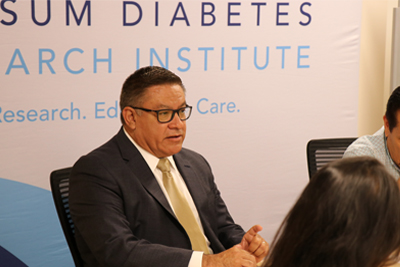Members of the local health and Latino communities, including special guest, Congressman Salud Carbajal (CA-24th District), gathered at Sansum Diabetes Research Institute (SDRI) earlier this month for a discussion about diabetes and how to improve access to healthcare in the Latino community.
During the August 7th event entitled, Make Diabetes History, SDRI’s Anthony Castillo, Dr. David Kerr and Jessikah Morales outlined the challenge posed by type 2 diabetes in the Latino population, as well as SDRI’s strategy to address it with their ground-breaking 10-year research project, Mil Familias.
Congressman Carbajal then invited suggestions from attendees–local Latino leaders in government, education, business, media, finance, social services and more–to facilitate Mil Familias’ success in Santa Barbara and to scale efforts throughout California and beyond.
“We are fortunate to have a world-class institute like SDRI in our community,” said Congressman Carbajal. “They have a history of contributions to the medical community in diabetes that have been adopted around the globe. Their added focus on type 2 diabetes research through the Mil Familias program is helping us understand why Latinos are twice as likely to develop type 2 diabetes than other groups, and their outreach gives people the tools to live well. The work of SDRI is pivotal to our region and our world, and I am committed to helping SDRI’s efforts–I encourage others to do the same.”
“We are very grateful for Congressman Carbajal’s support for this very important SDRI project,” said Ellen Goodstein, SDRI Executive Director.
“Mil Familias is a first-of-its-kind study to determine why the incidence of type 2 diabetes is disproportionately higher in the Latino population, with an ultimate goal of prevention and a cure,” added Goodstein.
SDRI’s Mil Familias research project began in 2017 with the goal of engaging 1,000 Latino families on the Central Coast to understand why diabetes is so prevalent and to establish education, prevention and treatment interventions to reduce the burden of diabetes, kidney failure, stroke and heart disease.
For many local families, it can be challenging to achieve optimum diabetes control, especially given that Latinos have had limited access to care and opportunities to participate in research (in fact, only 1% of clinical trial participants are Latino). Mil Familias and related SDRI initiatives enable Latinos to engage in, learn about, and benefit from diabetes research.
Mil Familias was bestowed the 2018 “Healthy Communities Champion” title by Pacific Coast Business Times.

